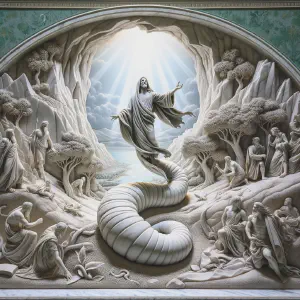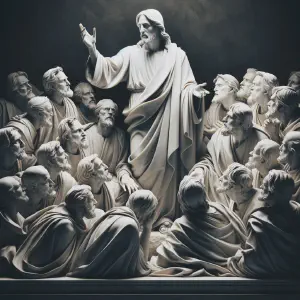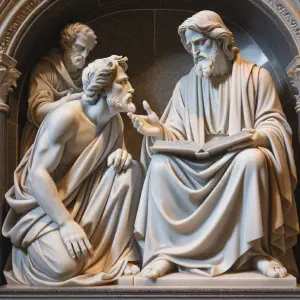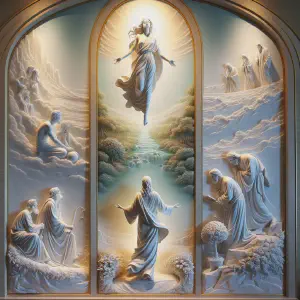The Promise of Redemption



Five Questions
What does the imagery of turning a desert into a land of rivers and fertile ground in Isaiah 41 symbolize?
This imagery symbolizes God’s power to transform desolation into abundance. It’s about turning what seems hopeless or barren in our lives into something fruitful and life-giving. This transformation is both a physical promise to Israel and a metaphor for spiritual renewal. It reassures us that God can change the most challenging situations into sources of strength and growth.
How does the Psalm 145 complement the message in Isaiah?
Psalm 145 celebrates God’s kindness, compassion, and faithfulness, themes that align with the promises made in Isaiah. While Isaiah focuses on specific transformations and God’s intervention in times of need, the Psalm broadens this to recognize God’s mercy and care for all His creation. It’s a hymn of praise that encourages us to trust in God’s providence and remember His eternal goodness.
In Matthew 11, why does Jesus say that the least in the Kingdom of Heaven is greater than John the Baptist?
This statement underscores the transformative nature of the Kingdom of Heaven. John, as a prophet, represented the pinnacle of human righteousness under the Old Covenant. However, Jesus is pointing out that the New Covenant, brought about through His life, death, and resurrection, offers a greater righteousness that is accessible to all believers. This righteousness surpasses even that of John, illustrating the profound change Jesus’ sacrifice brings into the lives of believers.
What is the significance of Jesus referring to John the Baptist as Elijah?
By referring to John the Baptist as Elijah, Jesus is connecting John’s ministry to the prophecy in Malachi 4:5, which foretold that Elijah would return before the great and dreadful day of the Lord. This identification signifies that John is the forerunner of the Messiah, preparing the way for Jesus. It also connects the work of Jesus to the prophetic tradition of Israel, fulfilling the expectations of the Jewish people for a Messiah.
How do these scriptures encourage us to respond to challenges and uncertainties in our lives?
These scriptures collectively encourage a response of trust and hope in God’s promises. Isaiah reminds us that God is with us in our struggles, transforming our weaknesses into strengths. The Psalm urges us to praise God in all circumstances, recognizing His enduring kindness. And in Matthew, the example of John the Baptist and Jesus’ teachings about the Kingdom of Heaven call us to embrace a transformative faith that looks beyond current challenges to the eternal promises of God. They teach us to rely on God’s strength and guidance in the face of difficulties.
Bible Study
Isaiah 41:13-20
I am the LORD, your God,
who grasp your right hand;
It is I who say to you, “Fear not,
I will help you.”
Fear not, O worm Jacob,
O maggot Israel;
I will help you, says the LORD;
your redeemer is the Holy One of Israel.
I will make of you a threshing sledge,
sharp, new, and double-edged,
To thresh the mountains and crush them,
to make the hills like chaff.
When you winnow them, the wind shall carry them off
and the storm shall scatter them.
But you shall rejoice in the LORD,
and glory in the Holy One of Israel.
The afflicted and the needy seek water in vain,
their tongues are parched with thirst.
I, the LORD, will answer them;
I, the God of Israel, will not forsake them.
I will open up rivers on the bare heights,
and fountains in the broad valleys;
I will turn the desert into a marshland,
and the dry ground into springs of water.
I will plant in the desert the cedar,
acacia, myrtle, and olive;
I will set in the wasteland the cypress,
together with the plane tree and the pine,
That all may see and know,
observe and understand,
That the hand of the LORD has done this,
the Holy One of Israel has created it.
This passage from Isaiah features God speaking directly to His people, Israel. God, the ultimate protector and redeemer, reassures Israel, depicted as weak and insignificant (‘worm Jacob, maggot Israel’), of His divine assistance. The transformation from weakness to a ’threshing sledge’ symbolizes God’s power to turn vulnerability into strength, aligning with Catholic teachings on God’s providential care (Catechism of the Catholic Church 302-305). The imagery of rejuvenating barren lands into fertile grounds mirrors Catholic values of hope and the transformative grace of God (CCC 1996-2000).
Psalm 145:1 and 9, 10-11, 12-13ab
R. (8) The Lord is gracious and merciful; slow to anger, and of great kindness.
I will extol you, O my God and King,
and I will bless your name forever and ever.
The LORD is good to all
and compassionate toward all his works.
R. The Lord is gracious and merciful; slow to anger, and of great kindness.
Let all your works give you thanks, O LORD,
and let your faithful ones bless you.
Let them discourse of the glory of your Kingdom
and speak of your might.
R. The Lord is gracious and merciful; slow to anger, and of great kindness.
Let them make known to men your might
and the glorious splendor of your Kingdom.
Your Kingdom is a Kingdom for all ages,
and your dominion endures through all generations.
R. The Lord is gracious and merciful; slow to anger, and of great kindness.
In this Psalm, attributed to King David, a central figure in both Jewish and Christian traditions, God is extolled for His greatness and mercy. The Psalm emphasizes God’s compassion and kindness, a reflection of His divine nature, which aligns with Catholic values of love and mercy (CCC 1822-1829). The Psalm’s portrayal of God’s kingdom as everlasting and inclusive mirrors the Church’s teaching on the universality and timelessness of God’s reign (CCC 1023-1029), and its encouragement to spread the word of God’s might and kingdom aligns with the Catholic call to evangelize (CCC 849-856).
Matthew 11:11-15
Jesus said to the crowds:
“Amen, I say to you,
among those born of women
there has been none greater than John the Baptist;
yet the least in the Kingdom of heaven is greater than he.
From the days of John the Baptist until now,
the Kingdom of heaven suffers violence,
and the violent are taking it by force.
All the prophets and the law prophesied up to the time of John.
And if you are willing to accept it,
he is Elijah, the one who is to come.
Whoever has ears ought to hear.”
This Gospel passage features Jesus Christ, the central figure of Christianity, speaking about John the Baptist, a key prophetic figure who prepared the way for Jesus. Jesus’ statement that ’the least in the Kingdom of heaven is greater than he’ underscores the transformative nature of Christ’s message and aligns with Catholic teachings on the dignity of the human person and the beatitudes (CCC 1716-1724). Referring to John as Elijah aligns with the Catholic understanding of the fulfillment of Old Testament prophecies in Christ (CCC 522-524). The passage’s emphasis on the active reception of God’s kingdom (‘Whoever has ears ought to hear’) echoes the Catholic emphasis on the importance of discerning and responding to God’s word (CCC 94-95, 1730-1731).
Lessons
These passages collectively teach us about God’s profound compassion and His transformative power. Isaiah speaks of God’s reassurance to His seemingly insignificant people, promising them strength and victory over their struggles. The Lord’s commitment to quenching the spiritual and physical thirst of the needy is a testament to His unending mercy. The Psalm reflects on God’s kindness, urging all creation to recognize and praise His eternal dominion. In the Gospel, Jesus highlights the significance of John the Baptist and the transformative nature of the Kingdom of Heaven, calling for a receptive heart to understand and embrace these divine truths. These scriptures remind us of the Lord’s continuous presence and action in our lives, encouraging us to trust in His promise of redemption and to actively participate in His Kingdom.
Meditation Prayer


